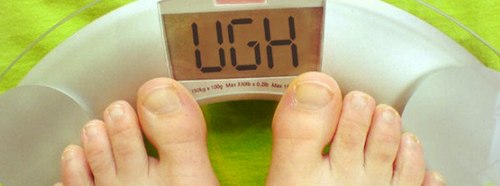Weight Loss Guide – The Simple Truth
 Nutri-this, diet-that, Paleo, Zone, South Beach, and weight loss can all be very confusing – if not overwhelming.
Nutri-this, diet-that, Paleo, Zone, South Beach, and weight loss can all be very confusing – if not overwhelming.
Here are some basic principles to start you off in your journey of transformation.
Weight loss or Fat loss?
When we talk about losing weight, we really want to focus on losing fat.
Weight loss can be muscle, water (fluid), or fat. Standing on the scales gives you no clue as to your body composition – so don’t weigh yourself too much – it can really play mind games.
Instead:
- Measure your Body Fat Percentage and track how it changes.
- Measure your waist with a measuring tape.
- Take photographs of yourself each week.
- Notice if your clothes are becoming looser.
Our weight is always fluctuating (sometimes due to fluid retention and menstruation timing in women). So, the scale is not the ideal tool to measure weight loss, but it is useful to track patterns over time.
How Do I Lose Fat?
In a nutshell, it’s a simple law of energy intake and expenditure. Eating more than you are using means you gain weight. Burning more than your eating means you lose weight…
Unfortunately, the real outworking of this is not so simple. Losing fat (for most people) is hard — get used to the idea, and then you won’t struggle so much with disappointment.

There are five principles to keep in mind:
- Diet (Nutrition): A healthy portion-controlled meal plan or 5-star meal prep is essential.
- Cardio (Exercise): Working your muscles and elevating your heart rate burns extra calories.
- Dedication (Consistency): You will need to address habits.
- Goals: Shoot for realistic weight loss goals like 1-2 pounds a week.
- Weight training: Keep muscles growing and repairing for added calorie burn and to avoid muscle weight loss.
It is possible to lose fat with the correct diet alone (for some people) – but the best chance of success will be to apply all these principles. Even the perfect diet plan can fail if you cannot stick to it.
Do I Have To Do Weight Training?
Weight (or strength) training is not essential to losing fat – but it helps.
A weight (or body weight) training workout boosts metabolism for the whole day and helps build lean muscle. Muscle is metabolically active – it needs fuel – and therefore helps you burn more calories all the time. If you are thinking about weight training – think about this:
Do I want my body to be strong and useful, or is my body only for people to look at?
Can’t I Just Skip Meals?

It’s naturally what seems like the easiest thing to do – but it’s not quite right.
“I must lose weight so I’m gonna starve myself”.
This is where things get a bit confusing.
Starve the body too much, and it gets the hint and slows down – you’ll feel irritable fatigued, and begin to lose muscle as well as fat. After clawing your way through hunger pangs and dreams of food, the chances are you will binge, or start eating back how you used to.
Guess what happens next? The weight piles on because your body is still in “slow” mode. Fat loss is all about calorie reduction, but a calorie intake that is too low will cause problems.
Do I Need to Exercise?
Few people have lost fat (and maintained it) without making exercise a part of their life.
Cardiovascular fitness has many health benefits – primarily keeping your heart strong. Including some form of exercise as a natural part of your life will give you an even bigger chance of success.
Just remember consistency! Cardio exercise could be brisk walking, jogging, cycling, swimming, treadmill, or elliptical trainer.
How many calories can be burnt doing various exercises?.
Do I Have to Spend Money to Lose Weight?
No. If you have enough nutritional knowledge and a whole lot of motivation, you can sort out your own lifestyle change. However, most of us don’t have the time or know-how to go it alone — so we pay someone else to design, explain, or customize a fat loss program.
Do Online Weight Loss Programs Work?
The Journal of the American Medical Association (JAMA) decided structured online weight loss programs worked better than “just browsing around”. “Participants who were given a structured behavioral treatment program with weekly contact and individualized feedback had better weight loss compared with those given links to educational Web sites.”
There Are So Many Diets to Choose From?
There are hundreds of diets. Some diets work for some – others don’t. Other diets are clearly faulty.
 Here’s some simple guidelines.
Here’s some simple guidelines.
- Avoid extremes (e.g. very-low-carb or very-low-fat).
- Learn about carbohydrates, proteins, and fats.
- Don’t be afraid of fat (it’s not the enemy). Research shows that moderate fat diets are as good or better than low fat diets.
- Learn about whole foods and learn how to reduce your intake of processed foods.
- There is no one-size-fits-all weight loss program.
- There are no magic bullets or miracle instant cures.
- There is absolutely EVERY chance that you can transform yourself.
- It is completely possible for you to lose the fat and get healthier.
- Believe in yourself.
We have a number of reviews of many popular weight loss programs. We do our best to try and have some objectivity, but the reality is – two different people can get two different results from the same program!
Where Do I Start?
- Clean up your diet: Get rid of sodas, refined sugars, and refined carbs. Eliminating processed foods usually takes care of all three.
- Get moving: Start exercising, even if it’s just a little each day.
- Get support: having the support of family, friends, or a weight loss community can really help.
- Choose a good diet plan: For those who struggle with designing their own.
Can it work for me?
Here’s the trick – we are all unique.
Different physical characteristics and different genetics. This is why each of us will have to do slightly different things to get the fat loss going.
Be prepared for a long-term commitment, a belief in change, and a new lifestyle. Weight loss will not only help you to feel emotionally and physically better, but it will also save you money by lowering health and life insurance costs.
You can do it. Say goodbye to being a victim. Small step by small step, you can achieve your goals. You may trip up, you may have setbacks – but remember – failure isn’t fatal !
- Rosenberg, M. (1998). Weight change with oral contraceptive use and during the menstrual cycle: results of daily measurements. Contraception, 58(6), 345-349. Link
- Jakicic, John M., et al. “American College of Sports Medicine position stand. Appropriate intervention strategies for weight loss and prevention of weight regain for adults.” Medicine and science in sports and exercise 33.12 (2001): 2145-2156. Link
- McManus, K., Antinoro, L., & Sacks, F. (2001). A randomized controlled trial of a moderate-fat, low-energy diet compared with a low fat, low-energy diet for weight loss in overweight adults. International journal of obesity and related metabolic disorders: journal of the International Association for the Study of Obesity, 25(10), 1503-1511.Link
- Noakes, M., Keogh, J. B., Foster, P. R., & Clifton, P. M. (2005). Effect of an energy-restricted, high-protein, low-fat diet relative to a conventional high-carbohydrate, low-fat diet on weight loss, body composition, nutritional status, and markers of cardiovascular health in obese women. The American journal of clinical nutrition, 81(6), 1298-1306. Link
- Ballantine, P. W., & Stephenson, R. J. (2011). Help me, I’m fat! Social support in online weight loss networks. Journal of Consumer Behaviour, 10(6), 332-337. Link
- Tate, D. F., Wing, R. R., & Winett, R. A. (2001). Using Internet technology to deliver a behavioral weight loss program. Jama, 285(9), 1172-1177. Link